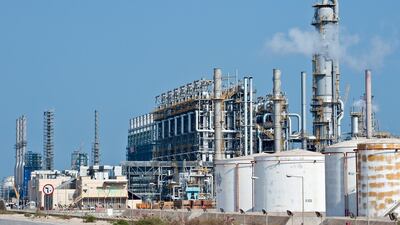The Middle East downstream industry, notably chemicals, requires fewer tariff barriers and higher efficiencies for additional capacity to compete with rivals in North America, China and India, according to analysts.
Despite having some of the lowest-cost oil reserves in the world, Middle East companies are unable to fully optimise these advantages in the chemicals sector, said Sanjay Sharma, vice president, Middle East and India at IHS Market.
“There’s not much domestic demand, growth rate is starting from a very small base, they’re primarily driven by the export market, high capital cost,” he said. Mr Sharma was speaking at an industry event on the regional downstream sector in Abu Dhabi.
National oil companies in the Middle East, which account for around 35 per cent of global oil production, have increasingly looked to beef up the downstream segment of their value chains to capture fast-growing consumer demand in China and South Asia. The downstream sector, which comprises refining and petrochemicals, has seen a distinct shift from regional NOCs who have favoured the industry with investment since the three-year slump in oil prices that began in 2014, attracted by its higher margins and more consistent returns.
Regional governments such as the UAE have allocated capital for downstream development in the domestic market and abroad, with state energy companies such as Adnoc looking to evolve as an integrated player. Adnoc has plans to invest up to $45 billion with its partners, in expansion and development of refining and chemicals capacities in its oil hub at Ruwais, which includes a project to develop the world's largest integrated refinery.
However, analysts say the region must be mindful of competitiveness and work towards removing trade barriers to compete with established players in China and India that are poised to add more capacity to market.
“China is back and they’re announcing projects on the basis of liquid feedstock, so they’re back in the business. North America is adding around 11 million tonnes of capacity. The Middle East is sitting on liquid feedstock, they need to find a competitive model to execute that,” said Mr Sharma.
“The product that comes from Singapore to India comes at zero tariffs whereas products from the Middle East go at 6 or 7 per cent tariff. So the governments should look to engage with free trade agreements.”
_______________
Read more:
Adnoc commissions specialised coker unit
Aramco-Sabic deal to spur consolidation in regional petchems
Exclusive: Borealis looks at expansion of its plastics recycling business
_______________
Arabian Gulf NOCs are currently laying the foundations, building refining and chemical complexes that can process oil to chemicals more seamlessly than before. Saudi Aramco, the world's top oil exporter, for instance, is developing a $20bn oil-to-chemicals complex with Sabic, the region's biggest chemical player on its Red Sea coast. The facility, which will be integrated with the existing refinery at Yanbu, could have as much as 70 per cent conversion rate for chemicals, one of the highest globally.
“You’re talking about massive, massive volumes coming out of [just] one complex,” said Mr Sharma.
However, the projects that will most likely be completed over the next five years have to compete increasingly with others under way in the Asia Pacific.
"Asia Pacific is expected to contribute more than 50 per cent to the demand growth, out of that China's contribution will likely be 20 per cent, India's growth rate is quite fast at 9 per cent," said Mr Sharma.
Another strategy for regional companies is to find ways to invest in projects in China and India in order to seize growth more efficiently. In June, both Aramco and Adnoc announced formation of a joint venture to invest in a planned $44bn refining and chemicals complex in the western coast of India, along with domestic state-backed companies.
Analysts expect regional oil companies to increasingly back such developments.
“It makes sense to stay closer to the main customer base,” said a chemical developer who declined to be identified.
“These will be strategic moves and [the Middle East] will have to be innovative with products. It’s almost like the oil companies now really have to go out there and sell their products. That’s some shift. It’s new for the industry,” he added.


